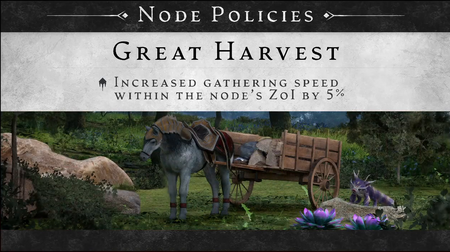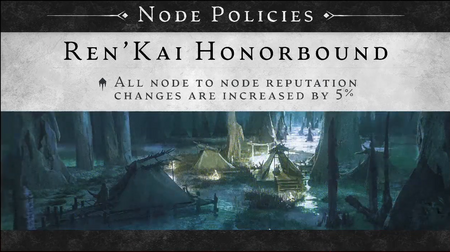Node policies
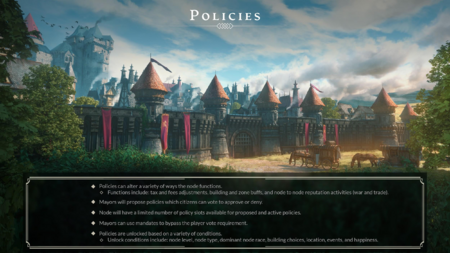
Nodes have a number of slots that they get to employ as Government policies that are enacted and chosen by the mayor and voted on by the people; and certain policies get unlocked by certain happiness states of the factions within the node; and those happiness states are predicated across different achievements that can happen in the world story arcs that get finished; bosses that get killed around you; new buildings that get constructed: Lots of different things can contribute to that happiness value: Number of citizens; number of citizens you've had leave; number of houses that might have been foreclosed upon. There's lots of different things that influence it, but when the happiness is met at a certain point- and even without that happiness you can still have policies that you get to enact regardless. You may choose policies that do certain things for the node; and this is a big strategic decision that the node has to almost agree on because it's voted on by the citizens within a short time period, but elected by the outstanding mayor; and when you deploy a policy it confers benefits to the citizens, or to the area, or to specific buildings, or to the mayor.[3] – Steven Sharif
Node policies affect a variety of node functions, such as taxes and fees, building and zone buffs, and node-to-node reputation activities, such as trade agreements, and node wars.[1][2]
- Mayors propose node policies that are voted on by citizens within a 24-hour or shorter time period.[1][2][3][4]
- Policies are voted in if the majority of voters approve of them.[5]
- Mayors can utilize their available mandates to bypass policy votes.[1][2][6]
- Mayors may also be able to take emergency actions depending on certain predicates that get met. This might allow them to reduce the voting threshold or voting time for policies.[5][3]
- There are a limited number of policy slots available to be proposed.[1][2] Some policies occupy multiple slots.[3]
- Node policies that are deployed will provide benefits to various aspects of the node, its citizens, its ZOI, its vassals (in some cases), specific buildings, and to its mayor.[5][3]
- Certain policies may affect the visual appearance of the node.[7]
- Some of the benefits you can receive by being a vassal of a certain parent is access to a policy that your node not might not normally have access to; and in fact you can also unlock an additional policy slot based on certain conditions that the parent or Sovereign node may have access to in their reliquary, or in their achievement systems, or in policies that they've elected. Some policies occupy multiple slots and it's almost like a card structure. You have each of these policies that live on a card and you get to select that card- throw it into the slot it goes out to the citizens to vote on within the 24-hour or sometimes shorter period. The mayor has emergency actions they can take right depending on certain predicates that get met and if an emergency action occurs they may be able to spend their influence as mayor within their term to set up a policy for a vote within an hour's period of time; and citizens in that way they can sneak it through a bit.[3] – Steven Sharif
Policies are unlocked by various conditions within a node.[1][2][3][4]
- Node level.[1][2]
- Node type.[1][2]
- Dominant node race.[1][2][3]
- Building choices.[1][2][3]
- Location of the node.[1][2]
- Events, such as node wars and node sieges.[5][1][2]
- Node happiness.[1][2][8][9]
- Achievements based on the completion of story arcs.[3]
- World bosses that are defeated.[3]
- Node citizens gained (or lost).[3]
- Node housing foreclosed upon.[3]
- There's a lot of different things that policies can influence; and policies exist within certain denominations. You have some policies that might be reflective of the culture that the node is representing; and you get access to those cultural policies. You have some policies that might become available because you've constructed a certain building type and now you've attracted a guild of NPCs that are weapons smiths. You might have some policies that are social organizations representative- you only get to build one social organization or Temple: which religion does the node follow. All of these are customization points that the city gets to choose and now you as a citizen get to identify the city that best aligns with your progression within the game and your game style and gameplay.[3] – Steven Sharif
Mayors
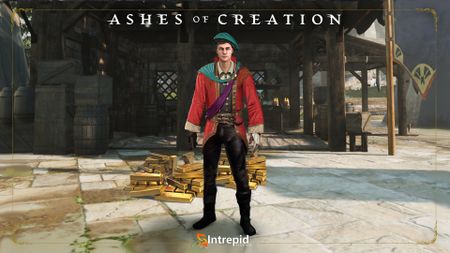
Mayors have a unique ability to elicit change within the node proper, either through the destruction of certain buildings that have been constructed previously, because there's a limited number of slots that buildings can be constructed within, or the kickoff of additional projects, or the certain types of policies that can be enacted, like... the changing of a tax rate. They all have a unified source of energy requirement and the energy requirement is a mandate.[6] – Steven Sharif
Mayors are chosen through different election methods according to the node's type.[11][12]
- Only node citizens may be elected mayor.[13]
- Previous mayors won't have any special system driven bonuses to help them get reelected.[15]
- Kings and Queens can also become a mayors.[13]
- Mayoral leadership powers are granted via the use of mandates.[6][16]
- Players will be able to view a historical listing of mayors of a node.[17]
Mayoral leadership powers

The government has a lot of say in the direction of the node's development. Directing assets, building projects, tax allocation, defensive ability etc. Players have the ability to not only create these cities, but they have the right of self-governance.[19]
Mayoral leadership powers are granted to mayors via the use of mandates.[6][16]
- Initiate buy orders using gold from the node treasury.[1][20][21][22]
- Initiate mayoral commissions to aid node development.[1][23][21][6][4][19]
- Adjust node taxes.[1][6][24] This includes setting tax rates that apply to tavern games.[25][26]
- Tax money may only be used to fund node development.[27]
- Initiate service building construction and expansions.[1][6]
- Improving node defensive structures, such as stronger walls and gates, traps, and siege equipment.[4][28][29][30][19]
- Hiring mercenary NPCs to defend the node during sieges.[31][19]
- Set a message-of-the-day for the node.[32]
- Proposing node policies that are voted on by citizens.[2][3][4]
- Mayors won't have formal systems to carry out surveys/polls of node citizens, but they will be able to utilize node citizen chat or message-of-the-day services.[32]
- Mayors may have special color names in node chat channels.[32]
- Entering into trade agreements with other nodes.[1][2][33]
- Mayors cannot denote players as enemies of the state.[35] Previously this was a potential option.[33][36]
- Mayors are notified when their node is named on a siege declaration scroll.[37]
- Mayors and lords of castles have spells they can use on the battlefield with high effect and long cooldowns for their teams.[38]
- Mayors gain new powers and responsibilities as their node advances.[12]
- Some leadership powers are specific to node type, biome, or dominant race, others are universal.[41]
- There definitely are differences... Some of the things that mayors can do are more universal, but then some systems have very specific if your node has a certain dominant race, or your node is a certain type, or it's in a certain biome. So there's even differences between where it is too.[41] – Chris Justo
- If a mayor does not make certain decisions within a set period of time then the system will make a decision for them.[43][44]
- Q: The idea behind all these nodes are awesome, but I wonder how it will actually play out in the live version. The problem is having player run or the problem with having player run towns is that people come and go in video games. So, will towns die out etc?
- A: We incorporate as part of those designs certain fail-safes, certain protections, certain automated progression that takes over when some of those decisions are lacking or are not made; and those decisions can be defaulted. Now, of course, that would have a deleterious effect on the direction that a particular node might want to go, because they're going to be doing default behaviors, or default actions, as opposed to something that might be in line with the strategic objective of that particular node, or the specialization that the node has previously been attempting to do. But that is why we have a regularly recurring election period where players can take the reins of power and can elect someone else to come in and participate and and re-right the ship, so to speak. So it is absolutely a component of having player-driven mechanics that there is an opportunity for things to be less than ideal, or less than strategic when certain bad-faith actors or people leave, but there are safeguards in place.[43] – Steven Sharif
Node-to-node reputation
Node-to-node reputation activities include trade agreements and wars between nodes.[1][2]
- Completing mayoral commissions will reward node-to-node reputation.[1][23]
Trade agreements
Mayors can enter into trade agreements with other nodes to facilitate trade between the nodes.[49][50][33]
- There are a limited number of trade agreements that a node can have.[49]
- Mayoral caravans may only be initiated between nodes with trade agreements or alliances.[49][50]
- Trade agreements affect reputation between the nodes.[1][2]
- Mercenary guilds will be a viable way forward for different organizations. I think there will be a lot of business to be had with that; and one of the systems in our trade agreements is creating an escrow for those particular type of arrangements that we're looking into.[51] – Steven Sharif
Node wars
Node governments may declare war on another node and rally citizens to the cause.[4][33]
- This mutually flags the citizens of the warring nodes, including their allies, as combatants.[52]
- Social organizations quests will either be cooperative or adversarial based on the war status of their parent nodes.[52]
- Vassal nodes cannot declare a node war on their parent node or any of their vassals.[12]
- Node wars can be declared at any time, but the objectives will only spawn during server prime-time.[53]
- Players can kill each other at any time during the war (not only during server prime-time).[53]
- Node wars affect reputation between the nodes.[1][2]
- We have conditions that you can set between nodes with regards to either nodes being friendly with each other and acting trade alliances, or they can declare war on nodes similar to how guild wars may function in different games, where those citizens become hostile to each other based on the player government that's elected in the particular node. So those systems all cater to allowing a conflict that's meaningful and that also provides a non-imbalanced relationship between stronger guilds and not as strong guilds.[54] – Steven Sharif
Visuals
See also
References
- ↑ 1.00 1.01 1.02 1.03 1.04 1.05 1.06 1.07 1.08 1.09 1.10 1.11 1.12 1.13 1.14 1.15 1.16 1.17 1.18 1.19 1.20 1.21 Blog: Development Update with Village Node.
- ↑ 2.00 2.01 2.02 2.03 2.04 2.05 2.06 2.07 2.08 2.09 2.10 2.11 2.12 2.13 2.14 2.15 2.16 2.17 Livestream, August 31, 2023 (44:21).
- ↑ 3.00 3.01 3.02 3.03 3.04 3.05 3.06 3.07 3.08 3.09 3.10 3.11 3.12 3.13 3.14 3.15 3.16 Livestream, August 26, 2022 (1:12:40).
- ↑ 4.0 4.1 4.2 4.3 4.4 4.5 4.6 Livestream, April 29, 2022 (27:42).
- ↑ 5.0 5.1 5.2 5.3 Livestream, August 31, 2023 (47:43).
- ↑ 6.0 6.1 6.2 6.3 6.4 6.5 6.6 Livestream, August 31, 2023 (31:44).
- ↑ Livestream, August 31, 2023 (49:13).
- ↑ 8.0 8.1 Livestream, April 7, 2023 (1:19:41).
- ↑ 9.0 9.1 Livestream, August 26, 2022 (1:17:04).
- ↑
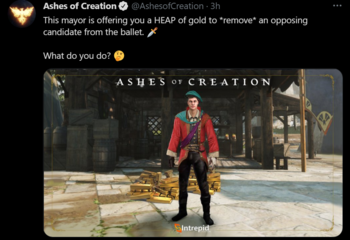
- ↑ Node series part II – the Metropolis.
- ↑ 12.0 12.1 12.2 Blog - Know Your Nodes - The Basics.
- ↑ 13.0 13.1 13.2

- ↑ Interview, May 11, 2018 (50:05).
- ↑ Livestream, August 31, 2023 (37:35).
- ↑ 16.0 16.1 Livestream, November 17, 2017 (9:49).
- ↑ Livestream, September 29, 2023 (1:05:44).
- ↑ Livestream, December 12, 2018 (14:48).
- ↑ 19.0 19.1 19.2 19.3 19.4 19.5 19.6 MMOGames interview, January 2017
- ↑ Livestream, August 31, 2023 (59:43).
- ↑ 21.0 21.1 Interview, July 8, 2020 (1:04:05).
- ↑ 22.0 22.1 Livestream, June 30, 2017 (53:57).
- ↑ 23.0 23.1 Livestream, August 31, 2023 (39:17).
- ↑ Livestream, March 28, 2020 (1:03:38).
- ↑

- ↑

- ↑

- ↑ Livestream, July 25, 2020 (1:22:40).
- ↑ Livestream, January 18, 2018 (37:05).
- ↑
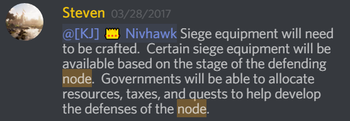
- ↑ Livestream, June 26, 2020 (59:11).
- ↑ 32.0 32.1 32.2 Livestream, August 31, 2023 (35:23).
- ↑ 33.0 33.1 33.2 33.3 33.4 City hall.
- ↑ Livestream, August 31, 2023 (29:04).
- ↑ Livestream, August 31, 2023 (30:41).
- ↑

- ↑ Livestream, December 23, 2021 (1:30:34).
- ↑ 38.0 38.1

- ↑ Livestream, July 25, 2020 (1:52:45).
- ↑ Livestream, August 31, 2023 (41:15).
- ↑ 41.0 41.1 Livestream, August 31, 2023 (28:30).
- ↑

- ↑ 43.0 43.1 Video, September 29, 2023 (1:52).
- ↑ Livestream, August 31, 2023 (29:33).
- ↑

- ↑ Livestream, May 19, 2017 (36:05).
- ↑ Livestream, May 19, 2017 (36:09).
- ↑
- ↑ 49.0 49.1 49.2 Livestream, August 31, 2023 (2:10:23).
- ↑ 50.0 50.1 Video, July 15, 2019 (2:12).
- ↑ Livestream, 2018-04-8 (AM) (18:59).
- ↑ 52.0 52.1 Interview, July 19, 2020 (24:34).
- ↑ 53.0 53.1

- ↑ Video, April 5, 2018 (41:48).
